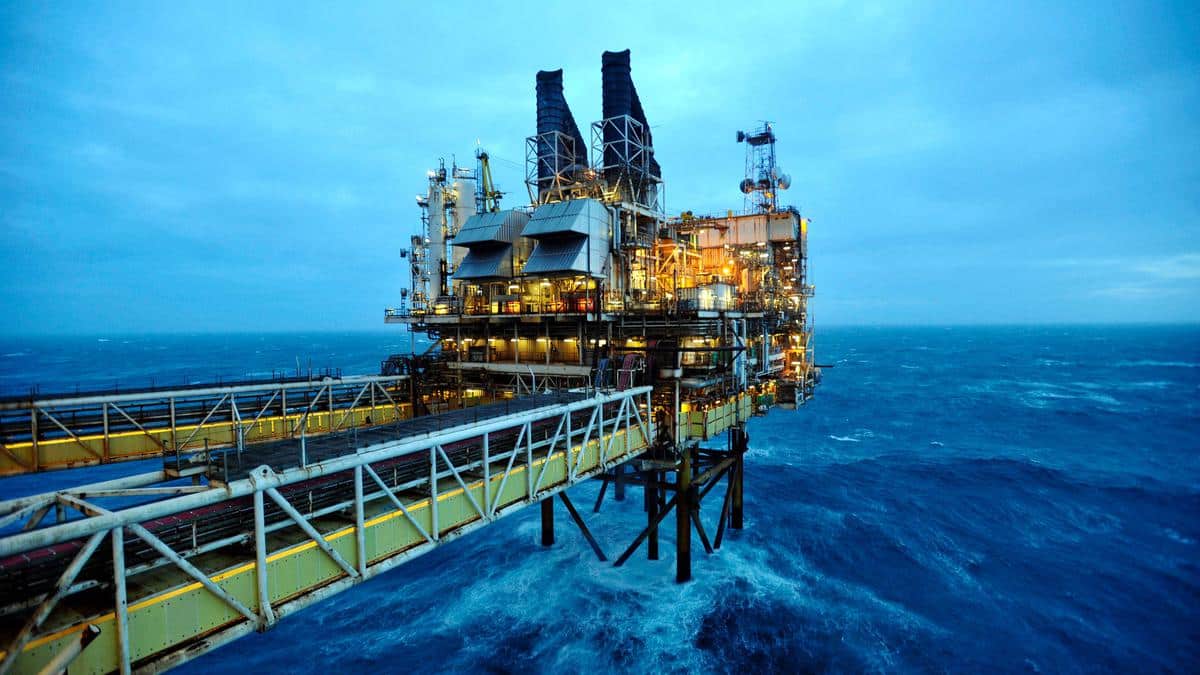What’s in Today’s Article?
- Why in News?
- About the North Sea
- A Short History of Drilling in the UK North Sea
- Why is Offshore Drilling Problematic?
- Is the U.K. Honouring its Climate Commitments?
Why in News?
- U.K. Prime Minister recently backed plans for new fossil fuel drilling off Britain’s coast, worrying environment experts even as the world continues its stride towards irreversible climate change.
- As the North Sea Transition Authority (NTSA), which is responsible for regulating oil, gas and carbon storage industries, conducts its 33rd offshore oil and gas licensing round, the move will assist Britain in becoming more energy independent.
About the North Sea:
- Geographically, the North Sea lies between England and Scotland on its west, the Netherlands, Belgium, and France on its south, and Norway, Denmark, and Germany on its west.
- An epeiric sea (an inland sea either completely surrounded by dry land or connected to an ocean by a river, strait or “arm of the sea”) on the European continental shelf.
- It connects to the Atlantic Ocean through the English Channel in the south and the Norwegian Sea in the north.
- It hosts key north European shipping lanes and is a major fishery. The coast is a popular destination for recreation and tourism in bordering countries, and a rich source of energy resources, including wind and wave power.
- It gained significant economic importance in the 1960s as the states around the North Sea began full-scale exploitation of its oil and gas resources.
A Short History of Drilling in the UK North Sea:
- The 1958 Geneva Convention on the Continental Shelf was the first international legislation to establish the rights of countries over the continental shelves adjacent to their coastlines.
- The treaty came into force in 1964 and paved the way for exploration in the North Sea.
- The U.K. Parliament passed the Continental Shelf Act 1964 that provides for exploration and exploitation of the continental shelf based on the 1958 convention.
- The first licence for exploration in the U.K. North Sea was awarded to British Petroleum (BP) in 1964.
- The following year, BP discovered natural gas in the North Sea, off the east Anglican coast.
- In 1970, BP made its first discovery of commercial oil in the large Forties Field east of Aberdeen, Scotland.
- In the next 15 years, BP started more than 15 fields in the U.K. North Sea (and four in the Norwegian North Sea).
- More British, European, and American companies continued their exploration of the North Sea, and by the 1980s, there were over a hundred installations looking for oil and gas.
- According to the U.K. government, production from the North Sea peaked in 1999 to 1,37,099 thousand tonnes of crude oil and natural gas liquids. By 2022, the total production declined to 38,037 thousand tonnes.
Why is Offshore Drilling Problematic?
- The offshore drilling puts workers, waters, and wildlife at risk.
- Drilling in seas and oceans for fossil fuels not only aggravates the threat of climate change but also warms oceans and raises sea levels.
- Offshore drilling is associated with a direct risk to marine biodiversity, as well as with indirect risks to coral reefs, shellfish and the marine ecosystem from acidic waters because of carbon pollution settling into oceans.
Is the U.K. Honouring its Climate Commitments?
- In the U.K., National Adaptation Programmes are statutory programmes that the government must follow to help prepare the country for climate change, as required under the Climate Change Act.
- The 2nd National Adaptation Programme covered the period of 2018 – 2023. According to reports, there is very limited evidence of the implementation of adaptation at the scale needed to fully prepare for climate risk.
- This means, K.’s climate action is not consistent with the Paris Agreement and its Nationally Determined Contributions (NDCs) and long-term targets do not represent a fair share of the global effort to address climate change.
- Licensing new oil and gas extraction plans is incompatible with the 1.5°C limit in the rise in temperature.
Q1) What are the Nationally Determined Contributions (NDCs)?
A NDC or intended NDC (INDC) is a non-binding national plan highlighting climate change mitigation, including climate-related targets for greenhouse gas emission reductions set out in the Paris Agreement.
Q2) How do offshore drilling work?
Offshore drilling is a mechanical process where a wellbore is drilled below the seabed. It is typically carried out in order to explore for and subsequently extract petroleum that lies in rock formations beneath the seabed.
Source: Explained | Drilling in the North Sea — history and environmental concerns
Last updated on January, 2026
→ Check out the latest UPSC Syllabus 2026 here.
→ Join Vajiram & Ravi’s Interview Guidance Programme for expert help to crack your final UPSC stage.
→ UPSC Mains Result 2025 is now out.
→ UPSC Notification 2026 is scheduled to be released on January 14, 2026.
→ UPSC Calendar 2026 has been released.
→ UPSC Prelims 2026 will be conducted on 24th May, 2026 & UPSC Mains 2026 will be conducted on 21st August 2026.
→ The UPSC Selection Process is of 3 stages-Prelims, Mains and Interview.
→ Prepare effectively with Vajiram & Ravi’s UPSC Prelims Test Series 2026 featuring full-length mock tests, detailed solutions, and performance analysis.
→ Enroll in Vajiram & Ravi’s UPSC Mains Test Series 2026 for structured answer writing practice, expert evaluation, and exam-oriented feedback.
→ Join Vajiram & Ravi’s Best UPSC Mentorship Program for personalized guidance, strategy planning, and one-to-one support from experienced mentors.
→ UPSC Result 2024 is released with latest UPSC Marksheet 2024. Check Now!
→ UPSC Toppers List 2024 is released now. Shakti Dubey is UPSC AIR 1 2024 Topper.
→ Also check Best UPSC Coaching in India


















